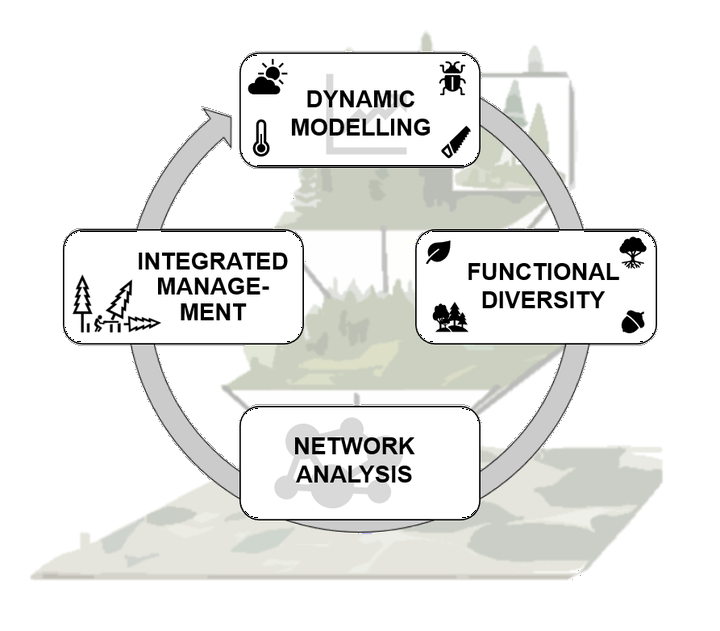REDEFiNE
 Method concepts in REDEFiNE
Method concepts in REDEFiNEProject duration
2018 - 2021 (collaborations ongoing in follow-up project DIVERSE)
Project overview
REDEFiNE: REsilience Diversity landscapE Forest NEtwork
The increasing frequency, intensity, and uncertainty of high-impact disturbance events due to global change are negatively impacting our ability to predict and manage forest growth and dynamics, therefore challenging the capacity to maintain ecological resilience and ecosystem services from forests worldwide. Forest ecosystems are complex adaptive systems, thus a multi-scale perspective and integrated landscape management approaches are needed to manage forests under increasing socio-ecological changes. One way to make forests more resilient to future threads is to increase functional diversity and redundancy at stand scale, and to optimize functional connectivity, centrality and modularity of forest patches in large fragmented landscapes. All this requires model-based evaluations of future landscape trajectories and a detailed analysis of the forested landscape as a functional complex network. This project aimed at coupling simulation modelling with methods based on functional diversity and network analysis to determine strategic interventions at stand and landscape scale to maximize the resilience of the forests to known and unknown disturbances.
We worked with the spatially-explicit forest landscape model LANDIS-II with the physiologically-based extension PnET-Succession , upscaling biochemical processes (e.g., photosynthesis, transpiration) from stand (1 ha) to landscape scale (>1M ha). We modelled forest landscape and disturbance dynamics in southern Quebec, testing alternative forest management strategies to increase forest resilience to changing climate and disturbance regimes.This project has been testing novel and innovative ways to implement resilience-based forest management for large forest landscapes that are typical of temperate ecosystems.
The project followed three main research steps:
- to couple process-based models of stand- and landscape-scale of forest dynamics with functional diversity and network theory;
- to evaluate multi-scale forest management options to maintain and increase resilience under scenarios of climate and global change;
- to determine threshold levels of functional diversity and functional connectivity below which the overall resilience of a landscape is threatened under combinations of natural disturbances.
The project has been financed in 2018-2019 via a career funding scheme awarded to Marco Mina by the Swiss National Science Foundation (Postdoc Mobility Grant N. 175101). Research activities on the topic are continuing in the framework of the Canada Research Chair in Forest Resilience to Global Changes awarded to Christian Messier and within the large pan-Canadian research project DIVERSE
Partners and collaborators
- Christian Messier Université du Québec à Montréal UQAM and Université du Québec en Outauais ISFORT-UQO
- Nuria Aquiluè Université du Québec à Montréal UQAM and Forest Sciences and Technology Centre of Catalonia CTFC, Solsona, Spain
- Matthew Duveneck New England Conservatory’s liberal arts & Harvard Forest, Petersham MA
- Marie Joseè Fortin University of Toronto
- Peter Osborne McGill Univerisity, Montreal
Key publications
Osborne P, Aquilué N, Mina M , Moe K, Jemtrud M, Messier C (2023). A trait-based approach to both forestry and timber building can synchronize forest harvest and resilience. PNAS Nexus, 2, 8 pgad254.
Mina M, Messier C, Duveneck M, Fortin MJ and Aquilué N (2022). Managing for the unexpected - Building resilient forest landscapes to cope with global change. Global Change Biology. 28, 4323– 4341.
Mina M, Messier C, Duveneck M, Fortin MJ and Aquilué N (2021). Network analysis can guide resilience-based management in forest landscapes under global change. Ecological Applications. 31(1):e02221.
Aquilué N, Messier C, Martins KT, Dumais-Lalonde V, Mina M (2021). A simple-to-use management approach to boost forests adaptive capacity to global uncertainty. Forest Ecology and Management. 481(118692).
Messier C, Bauhus J, Doyon F, Maure F, Sousa-Silva R, Nolet P, Mina M, Aquilué N, Fortin MJ and Puettmann K (2019). The functional complex network approach to foster forest resilience to global changes. Forest Ecosystems 6:21. Summarized in the EFI Resilience Blog